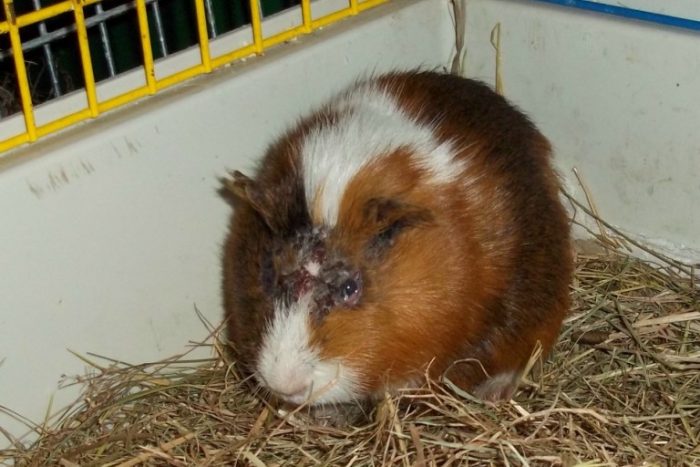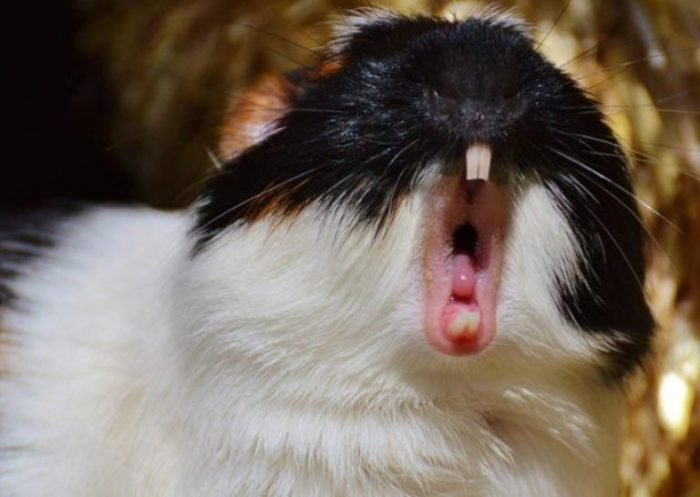Being a pet parent entails ensuring that our pets are sound and safe. Even the least of health issues can raise concern among owners and this is true for people who keep those little, cute, adorable, calming, affable, low-maintenance bundle of fur called guinea pigs. Undoubtedly, these tiny furries are the best animals to keep as household pets as they will make an awesome addition to any family that adopts them. The experience of having this bundle of joy is truly fantastic, especially for children. However, they are prone to a lot of health issues like other pets in that category. Now, what do we know about guinea pig sneezing and what are the possible causes, effects, and treatments?
Table of Contents
Is It Normal For A Guinea Pig To Sneeze?
Guinea pig sneezing is not something to be worried about when it comes occasionally. It may be that your furry friend has a blockage in the airways that needs shifting; just like in humans, sneezing in guinea pigs may just be to facilitate the ejection of unwanted elements lurking in the nasal cavity.
However, every pet parent should be vigilant with these furballs when the sneezing becomes out of the ordinary, especially when it is constantly repeated and comes with accompanying symptoms that are alarming like watery eyes, runny nose, lethargy, hunched posture, crackly, noisy or labored breathing, behavioral changes, and coughing or wheezing. At this point, the vet’s attention will be needed. But we should bear in mind that sneezing from time to time is one of the natural phenomena observed among most animals, including guinea pigs.
Possible Causes Of Guinea Pig Sneezing

Guinea Pig Sneezing can be a result of so many factors, including;
- Sneezing in guinea pigs can be triggered by excessive exposure to dust and smoke, just like in humans. When gorging down hay, some dust may be present in the stacks which can easily permeate through their nostrils, giving rise to sneezing. Food leftovers inside the respiratory tract can also result in guinea pig sneezing.
- These cute furballs are very sensitive and may react to a sudden change in the environment.
- The presence of allergens may also trigger sneezing. Allergens can come in the form of a strong perfume scent or any other pungent odor that does not agree with your furry friend’s sense of smell.
- Guinea pig sneezing can also emanate from a common cold resulting from an infection in the upper respiratory system. Infection in the lower respiratory system can lead to pneumonia, thus a vet’s attention will be needed. Note that respiratory issues are relatively common among these cuties.
- Any form of particles in the nose can lead to sneezing for both humans and animals.
Ripple Effects Of Constant Sneezing In Guinea Pigs And What They Might Portend
It is important to observe a sneezing guinea pig in order to know when things get serious, especially if the sneezing is recurrent.
Watch out for signs of physical problems like watery eyes, nasal secretion, drooling, difficulty breathing, inflammation around the eyes, and fatigue. When any of these symptoms are observed, it is time to call the vet.
An upper respiratory infection can be indicated by any of these symptoms:
- Coughing
- Wheezing
- Laboured or heavy breathing
- Cracking sound emanating from the furry’s inside
- Nose and eye discharge
- Semi-closed eyes
If these accompanying symptoms are absent, then, guinea pig sneezing may well be a result of allergens. Things that can cause allergy in guinea pigs to include:
- Cleaning products
- Air fresheners/Aerosols
- Body care products that are heavily scented
- Detergents or washing liquids for fabrics cleaning
Guinea Pig Sneezing: Signs To Watch Out For
Observe your little fur closely to see if any of these are evident:
- If it is an infection or allergy
The guinea pig’s eyes will be impacted – some discharge may come from the eyes and can be yellow or green in color. You may observe some crustiness in the eyes which will turn red. This is usually a resultant effect of conjunctivitis.
- Observe the pet’s breathing pattern
When illness is suspected in your guinea pig, observe if its breathing is normal or not. Your furry pet isn’t breathing normally if noises of wheezing and clicking are observed.
- Look out for any nasal discharge
An infected guinea pig may end up with a red nose which will agitate it as the pet tries to scratch or rub on it. This is mostly due to an allergy that causes an itchy nose. If a respiratory problem is the cause of guinea pig sneezing, some nose discharge will be observed. When the furball sneezes, a yellowish discharge will come from the nose.
- Unusual emaciation
The overall appearance of your furry friend may deteriorate if it has come down with an infection. It will appear weak and meek. This is a result of weight loss caused by the infection.
- Your piggy friend may become lethargic
Naturally, guinea pigs are known to be fun-loving and enthusiastic, always eager to play with you on a normal day. However, if any respiratory issue or allergy is present, they will be less sociable and avoid interactions with friends. Your piggy friend will wear a sleepy and tired look all the time.
- Aversion to eating
Loss of appetite is one of the critical signs of a respiratory issue in guinea pigs. As your cutie feels sick, it’ll avoid eating. Carefully observe the amount of food eaten if any health problem is suspected.
- Bleeding nose
Among the most severe symptoms of health problems in guinea pigs is a bleeding nose. It’s a sure sign that something is definitely wrong with your pet and the vet’s immediate attention is required.
Read Also: How To Care For Miniature Goats As Pets
Remedy To Consistent Guinea Pig Sneezing
Steps abound which can be taken to prevent the cases of guinea pig sneezing.
- The little furry’s cage should be located in a well-ventilated spot, far from the kitchen so as to avoid exposure to strong aromas and smoke.
- Of great importance is getting the correct bedding conditions; your best bet is to go for absorbent bedding which reduces smells by soaking up any mess.
- Expose the pig to poop training early and give the cage a weekly cleaning to prevent the germs from growing.
- Feed your guinea pig with superior quality hay devoid of dust to avoid triggering an allergy.
- Treatment for serious allergies can include specialized care like getting the surroundings of the pig’s tank humidified.
- Antibodies may suffice for a pig with an upper respiratory infection; this must be prescribed by the vet.
